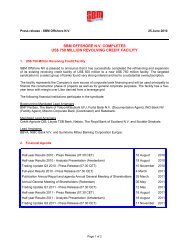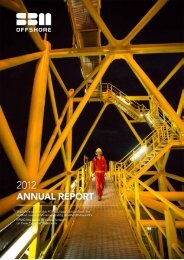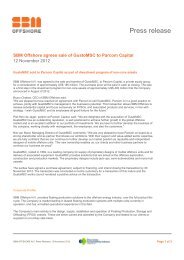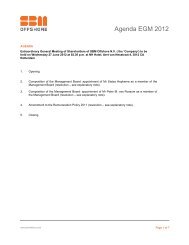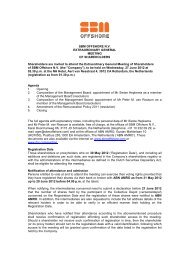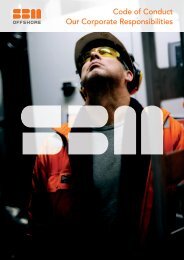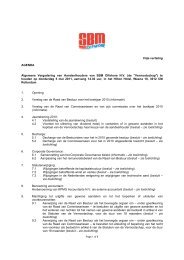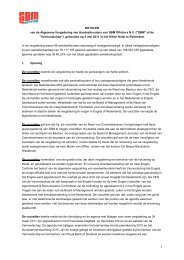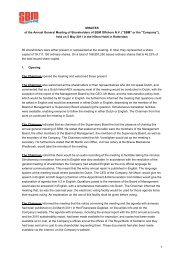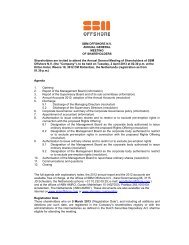Prospectus - SBM Offshore
Prospectus - SBM Offshore
Prospectus - SBM Offshore
You also want an ePaper? Increase the reach of your titles
YUMPU automatically turns print PDFs into web optimized ePapers that Google loves.
claiming infringement (on potentially unattractive terms). This could result in unexpected costs, disruption to<br />
the business, a decrease in the value of the Group's products, services or technology, restrictions on the way the<br />
Group can use, market or sell its products or services or do business, and an adverse effect on its business,<br />
results or financial condition.<br />
For example, in the case of FPSO contracts, the Group may indemnify the customer for any infringement<br />
claims. If any of the intellectual property rights are not owned or validly licensed by the Group, then the Group<br />
could be liable to the owner of the rights as well as to the client. If a claim were successful, the Group may<br />
have to pay damages and legal costs, and may be restrained from using the relevant technology until the claim<br />
is decided. This could result in disruption to the business and potentially give rise to further claims.<br />
(cc) Infringement by third parties of the Group's intellectual property rights could damage the Group's<br />
business. Decisions of courts and changes in laws and regulations could affect the value of the<br />
Group's intellectual property rights or their enforceability.<br />
The Group owns certain intellectual property rights, such as trade marks, patents and copyrights which it uses<br />
in the business. If another party were to infringe those rights (for instance, if a subcontractors, such as a<br />
fabrication yard, were to attempt to copy the Group's designs in violation of the Group's patent or other<br />
intellectual property rights), this could damage the Group's business by reducing the value of the rights,<br />
causing damage to the Group's brand and loss of revenues and market share. Taking enforcement action could<br />
involve considerable cost, and may not be successful, especially in countries where protection of intellectual<br />
property rights is limited. Making an enforcement claim against another party could result in that party claim<br />
making a counterclaim against the Group. This could cause the Group to be stopped from selling a particular<br />
product or service, be forced to pay for a licence of the rights or to pay damages to the other party. This could<br />
adversely affect the Group's business, results or financial condition.<br />
Court decisions and changes to laws or regulations could affect the value of the Group's intellectual property<br />
rights or the Group's ability to enforce its rights. Governments could require compulsory licensing of certain<br />
intellectual property rights, or that products meet specified standards which the products to which the Group's<br />
rights relate do not meet. This could decrease the value of the Group's intellectual property rights or limit the<br />
Group's ability to exploit them, which could adversely impact the Group's business, results or financial<br />
condition.<br />
(dd) The Group could be subject to intellectual property theft or misuse, which could result in third<br />
party claims and harm its business and results of operations.<br />
The Group could face attempts by others to gain unauthorised access to the Group's information technology<br />
systems, which could threaten the security of the Group's information and stability of its systems. These<br />
attempts could arise from industrial or other espionage or actions by hackers seeking to harm the company or<br />
its clients. Although the Group seeks to detect and prevent such theft and attacks, it may not be successful in<br />
doing so. Theft, unauthorised access and use of trade secrets or other confidential business information as a<br />
result of such an incident could disrupt the Group's business and adversely affect its reputation and competitive<br />
position, which could adversely affect the Group's business, results or financial condition.<br />
(ee) The Group's licensing of its patents to other companies in the industry and through industry<br />
standard organisations could make it more difficult for the Group to monitor and enforce its rights.<br />
It may allow other companies to use its patent rights to produce a competing product.<br />
Companies in the offshore industry sometimes license patents from each other in order to compete. Under<br />
current case law, some of these licences may permit the licensee to sublicense these rights to others. This could<br />
make it more difficult to monitor and enforce the Group's patent rights, which could increase legal costs, and<br />
potentially, lead to claims of infringement. It could result in a competitor being able to use the Group's patent<br />
rights to manufacture competing products. These factors could decrease the value of the Group's patent rights<br />
and damage its business.<br />
0105735-0000002 AMCO:5624830.1 38



